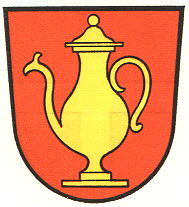Königheim: Difference between revisions
Knorrepoes (talk | contribs) m (Text replace - "'''Origin/meaning :'''<br/>" to "====Origin/meaning====") |
Knorrepoes (talk | contribs) m (Text replace - "|width="15%"|50 px|right |}" to "|width="15%"|50 px|right |}<seo title="Wappen, Gemeindewappen" />") |
||
| Line 3: | Line 3: | ||
|width="70%" align="center" |'''Heraldry of the World<br/>Civic heraldry of [[Germany]] - [[Deutsche Wappen|Deutsche Wappen (Gemeindewappen/Kreiswappen)]]''' | |width="70%" align="center" |'''Heraldry of the World<br/>Civic heraldry of [[Germany]] - [[Deutsche Wappen|Deutsche Wappen (Gemeindewappen/Kreiswappen)]]''' | ||
|width="15%"|[[File:Germany.jpg|50 px|right]] | |width="15%"|[[File:Germany.jpg|50 px|right]] | ||
|} | |}<seo title="Wappen, Gemeindewappen" /> | ||
Revision as of 17:47, 5 November 2012
| Heraldry of the World Civic heraldry of Germany - Deutsche Wappen (Gemeindewappen/Kreiswappen) |
KÖNIGHEIM
State : Baden-Württemberg
District (Kreis) : Main-Tauber Kreis (until 1973 Tauberbischofsheim)
Additions : 1972 Brehmen, Gissigheim; 1973 Pülfringen
Origin/meaning
The arms were adopted in July 1901.
The oldest seal of Königheim was already mentioned in the 15th century, but only a 19th century seal remained. The seal already showed the pot. The pot also appeared on the oldest known use of the arms on a stone decoration dating from 1499.
The pot (Kanne) is canting, the name was pronounced as 'Kennichen'. Also on a stone relief on the city hall dating from 1707 the arms are used.
As no colours were known, it was decided in 1901 to use the colours of Baden.
Literature : Stadler, K. : Deutsche Wappen - Bundesrepublik Deutschland. Angelsachsen Verlag, 1964-1971, 8 volumes.

